- Home
- FPMT Homepage
Foundation for the Preservation of the Mahayana Tradition
The FPMT is an organization devoted to preserving and spreading Mahayana Buddhism worldwide by creating opportunities to listen, reflect, meditate, practice and actualize the unmistaken teachings of the Buddha and based on that experience spreading the Dharma to sentient beings. We provide integrated education through which people’s minds and hearts can be transformed into their highest potential for the benefit of others, inspired by an attitude of universal responsibility and service. We are committed to creating harmonious environments and helping all beings develop their full potential of infinite wisdom and compassion. Our organization is based on the Buddhist tradition of Lama Tsongkhapa of Tibet as taught to us by our founders Lama Thubten Yeshe and Lama Thubten Zopa Rinpoche.
- Willkommen
Die Stiftung zur Erhaltung der Mahayana Tradition (FPMT) ist eine Organisation, die sich weltweit für die Erhaltung und Verbreitung des Mahayana-Buddhismus einsetzt, indem sie Möglichkeiten schafft, den makellosen Lehren des Buddha zuzuhören, über sie zur reflektieren und zu meditieren und auf der Grundlage dieser Erfahrung das Dharma unter den Lebewesen zu verbreiten.
Wir bieten integrierte Schulungswege an, durch denen der Geist und das Herz der Menschen in ihr höchstes Potential verwandelt werden zum Wohl der anderen – inspiriert durch eine Haltung der universellen Verantwortung und dem Wunsch zu dienen. Wir haben uns verpflichtet, harmonische Umgebungen zu schaffen und allen Wesen zu helfen, ihr volles Potenzial unendlicher Weisheit und grenzenlosen Mitgefühls zu verwirklichen.
Unsere Organisation basiert auf der buddhistischen Tradition von Lama Tsongkhapa von Tibet, so wie sie uns von unseren Gründern Lama Thubten Yeshe und Lama Thubten Zopa Rinpoche gelehrt wird.
- Bienvenidos
La Fundación para la preservación de la tradición Mahayana (FPMT) es una organización que se dedica a preservar y difundir el budismo Mahayana en todo el mundo, creando oportunidades para escuchar, reflexionar, meditar, practicar y actualizar las enseñanzas inconfundibles de Buda y en base a esa experiencia difundir el Dharma a los seres.
Proporcionamos una educación integrada a través de la cual las mentes y los corazones de las personas se pueden transformar en su mayor potencial para el beneficio de los demás, inspirados por una actitud de responsabilidad y servicio universales. Estamos comprometidos a crear ambientes armoniosos y ayudar a todos los seres a desarrollar todo su potencial de infinita sabiduría y compasión.
Nuestra organización se basa en la tradición budista de Lama Tsongkhapa del Tíbet como nos lo enseñaron nuestros fundadores Lama Thubten Yeshe y Lama Zopa Rinpoche.
A continuación puede ver una lista de los centros y sus páginas web en su lengua preferida.
- Bienvenue
L’organisation de la FPMT a pour vocation la préservation et la diffusion du bouddhisme du mahayana dans le monde entier. Elle offre l’opportunité d’écouter, de réfléchir, de méditer, de pratiquer et de réaliser les enseignements excellents du Bouddha, pour ensuite transmettre le Dharma à tous les êtres. Nous proposons une formation intégrée grâce à laquelle le cœur et l’esprit de chacun peuvent accomplir leur potentiel le plus élevé pour le bien d’autrui, inspirés par le sens du service et une responsabilité universelle. Nous nous engageons à créer un environnement harmonieux et à aider tous les êtres à épanouir leur potentiel illimité de compassion et de sagesse. Notre organisation s’appuie sur la tradition guéloukpa de Lama Tsongkhapa du Tibet, telle qu’elle a été enseignée par nos fondateurs Lama Thoubtèn Yéshé et Lama Zopa Rinpoché.
Visitez le site de notre Editions Mahayana pour les traductions, conseils et nouvelles du Bureau international en français.
Voici une liste de centres et de leurs sites dans votre langue préférée
- Benvenuto
L’FPMT è un organizzazione il cui scopo è preservare e diffondere il Buddhismo Mahayana nel mondo, creando occasioni di ascolto, riflessione, meditazione e pratica dei perfetti insegnamenti del Buddha, al fine di attualizzare e diffondere il Dharma fra tutti gli esseri senzienti.
Offriamo un’educazione integrata, che può trasformare la mente e i cuori delle persone nel loro massimo potenziale, per il beneficio di tutti gli esseri, ispirati da un’attitudine di responsabilità universale e di servizio.
Il nostro obiettivo è quello di creare contesti armoniosi e aiutare tutti gli esseri a sviluppare in modo completo le proprie potenzialità di infinita saggezza e compassione.
La nostra organizzazione si basa sulla tradizione buddhista di Lama Tsongkhapa del Tibet, così come ci è stata insegnata dai nostri fondatori Lama Thubten Yeshe e Lama Zopa Rinpoche.
Di seguito potete trovare un elenco dei centri e dei loro siti nella lingua da voi prescelta.
- 欢迎 / 歡迎
简体中文
“护持大乘法脉基金会”( 英文简称:FPMT。全名:Foundation for the Preservation of the Mahayana Tradition) 是一个致力于护持和弘扬大乘佛法的国际佛教组织。我们提供听闻,思维,禅修,修行和实证佛陀无误教法的机会,以便让一切众生都能够享受佛法的指引和滋润。
我们全力创造和谐融洽的环境, 为人们提供解行并重的完整佛法教育,以便启发内在的环宇悲心及责任心,并开发内心所蕴藏的巨大潜能 — 无限的智慧与悲心 — 以便利益和服务一切有情。
FPMT的创办人是图腾耶喜喇嘛和喇嘛梭巴仁波切。我们所修习的是由两位上师所教导的,西藏喀巴大师的佛法传承。
繁體中文
護持大乘法脈基金會”( 英文簡稱:FPMT。全名:Found
ation for the Preservation of the Mahayana Tradition ) 是一個致力於護持和弘揚大乘佛法的國際佛教組織。我們提供聽聞, 思維,禪修,修行和實證佛陀無誤教法的機會,以便讓一切眾生都能 夠享受佛法的指引和滋潤。 我們全力創造和諧融洽的環境,
為人們提供解行並重的完整佛法教育,以便啟發內在的環宇悲心及責 任心,並開發內心所蘊藏的巨大潛能 — 無限的智慧與悲心 – – 以便利益和服務一切有情。 FPMT的創辦人是圖騰耶喜喇嘛和喇嘛梭巴仁波切。
我們所修習的是由兩位上師所教導的,西藏喀巴大師的佛法傳承。 察看道场信息:
- FPMT Homepage
- News/Media
-
- Study & Practice
-
-
- About FPMT Education Services
- Latest News
- Programs
- New to Buddhism?
- Buddhist Mind Science: Activating Your Potential
- Heart Advice for Death and Dying
- Discovering Buddhism
- Living in the Path
- Exploring Buddhism
- FPMT Basic Program
- FPMT Masters Program
- FPMT In-Depth Meditation Training
- Maitripa College
- Lotsawa Rinchen Zangpo Translator Program
- Universal Education for Compassion & Wisdom
- Online Learning Center
-
- Prayers & Practice Materials
- Overview of Prayers & Practices
- Full Catalogue of Prayers & Practice Materials
- Explore Popular Topics
- Benefiting Animals
- Chenrezig Resources
- Death & Dying Resources
- Lama Chopa (Guru Puja)
- Lama Zopa Rinpoche: Compendium of Precious Instructions
- Lama Zopa Rinpoche: Life Practice Advice
- Lama Zopa Rinpoche Practice Series
- Lamrim Resources
- Mantras
- Prayer Book Updates
- Purification Practices
- Sutras
- Thought Transformation (Lojong)
- Audio Materials
- Dharma Dates - Tibetan Calendar
- Translation Services
- Publishing Services
- Ways to Offer Support
- Prayers & Practice Materials
-
- Teachings and Advice
- Find Teachings and Advice
- Lama Zopa Rinpoche Advice Page
- Lama Zopa Rinpoche: Compendium of Precious Instructions
- Lama Zopa Rinpoche Video Teachings
- ༧སྐྱབས་རྗེ་བཟོད་པ་རིན་པོ་ཆེ་མཆོག་ནས་སྩལ་བའི་བཀའ་སློབ་བརྙན་འཕྲིན།
- Podcasts
- Lama Yeshe Wisdom Archive
- Buddhism FAQ
- Dharma for Young People
- Resources on Holy Objects
- Teachings and Advice
-
-
*If a menu item has a submenu clicking once will expand the menu clicking twice will open the page.
-
-
- Centers
-
- Teachers
-
- Projects
-
-
-
-
*If a menu item has a submenu clicking once will expand the menu clicking twice will open the page.
-
-
- FPMT
-
- Shop
-
-
-
The Foundation Store is FPMT’s online shop and features a vast selection of Buddhist study and practice materials written or recommended by our lineage gurus. These items include homestudy programs, prayers and practices in PDF or eBook format, materials for children, and other resources to support practitioners.
Items displayed in the shop are made available for Dharma practice and educational purposes, and never for the purpose of profiting from their sale. Please read FPMT Foundation Store Policy Regarding Dharma Items for more information.
-
-
19
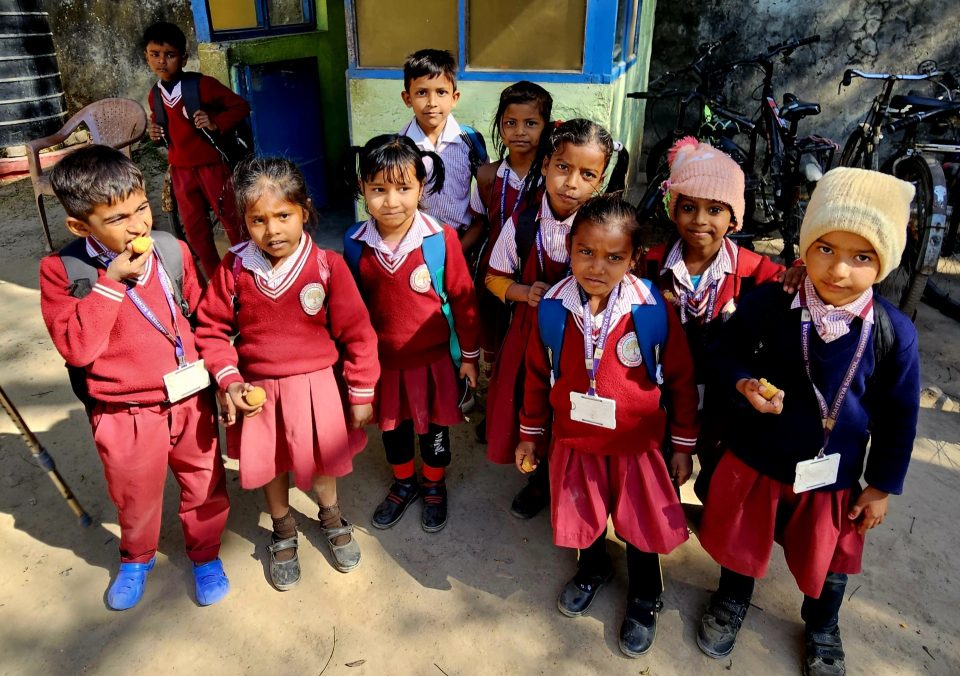
Young students of Maitreya School. Photo by Donna Lynn Brown.
Maitreya School, a project of the Root Institute in Bodhgaya, India, is dedicated to providing quality education while fostering the overall growth and well-being of its 250+ students. The school integrates academic excellence with cultural awareness and personal development through a variety of enriching programs and activities. Recently, former associate editor of Mandala Publications, Donna Lynn Brown, spent extensive time at Root Institute and was inspired by the program at Maitreya School. What follows is a moving portrait of this special school, and the incredible value it offers its students.
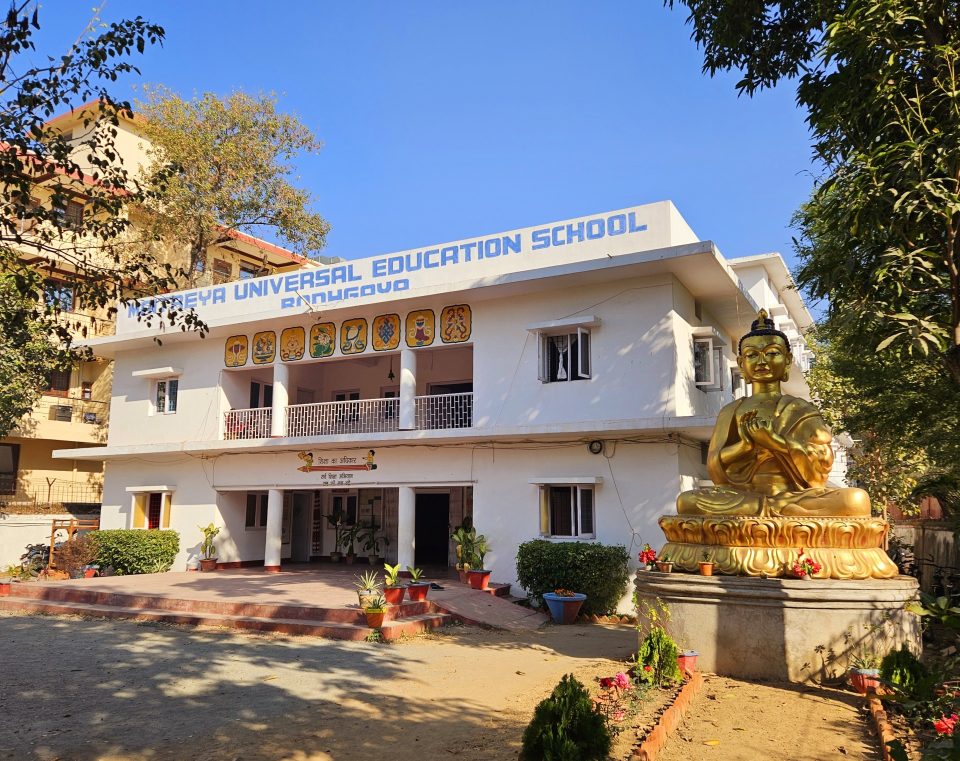
Maitreya Universal Education School, Bodh Gaya, February 2025. Photo by Donna Lynn Brown.
By Donna Lynn Brown
“It was so auspicious,” reflected Kabir Saxena, trustee of Root Institute for Wisdom Culture in Bodhgaya, India. He was describing the visit, on February 6, 2025, of schoolchildren from Root Institute’s Maitreya Universal Education School to the main stupa in Bodhgaya, located where the Buddha attained enlightenment. The children, from grades 6, 7, and 8, went by bus to the stupa with Kabir, teachers, and volunteers to learn about the site and the Nyingma Monlam, a large prayer festival taking place there.
Although the children live in the area, they know little about the stupa. Kabir explained what had happened there and what the children were observing as they circumambulated. At one point, spotting some distinguished friends—a member of the Buddhist Temple Management Committee and a daughter of Tarthang Tulku, Tsering Gellek, who directs the Nyingma Institute in Sarnath, India—Kabir asked some of the schoolgirls if they remembered the Heart Sutra. They had learned it in Sanskrit earlier so they could perform it before His Holiness the Dalai Lama; the school does this every year. There and then, at India’s holiest Buddhist site, Maitreya School’s students chanted the Heart Sutra in India’s holy language. Auspicious indeed!
This inspiring incident is only one of many these days involving the school. Over the last two years the school has been changing to become more child-centered. Many of its students come from households affected by poverty, alcoholism, or abuse. They need trauma-informed approaches. And both brain and trauma research show that children learn better from contemporary pedagogies that support them psychologically and emotionally than from textbook-based lectures. Gradually, the school is implementing activity- and project-based learning: less explaining by teachers standing at the blackboard; more child-focused methods and activities.
Guiding this process is “Kabir Sir,” as the students call him, who is working with Sanjeev Kumar, the school principal, to bring Lama Zopa Rinpoche’s vision to fruition. “Rinpoche gave us many ideas,” he reported. “But the main thrust was to help the children develop spiritually, psychologically, and emotionally while giving them an education that helps them and their communities. Rinpoche thought we should make them like warriors who bring peace and happiness into the world. The last couple of years, fortunately, we’ve had staff and volunteers able to move us in that direction. It’s not fast. It’s day by day, improving the way each class is taught. We work on the teachers’ skills, the resources they can draw on, the way classes unfold. Slowly we make progress.”
Greater attention to the children’s psychological state is one way the school is moving forward. During the 23/24 year, an Indian volunteer from Kolkata, Sanjana, provided many students with counseling. This year, a Canadian psychotherapist, nicknamed Sherpa, spent two weeks working with children and teachers. Through art therapy done individually and in groups, he helped “troublesome” children to develop skills in working with others, avoiding conflict, and handling emotions like anger and jealousy. He also sought to improve the teachers’ understanding of children’s learning processes and to share ways of meeting children’s needs so they have space to learn. “If kids are happy and relaxed,” he emphasized, “they learn better. There’s less resistance, less avoidance, less work for teachers.” He found that “some of the students are really brilliant and talented,” and added, “we don’t want to ignore or waste that. Their futures, families, and society all need them to flourish.” He hopes to come back next year to do more.
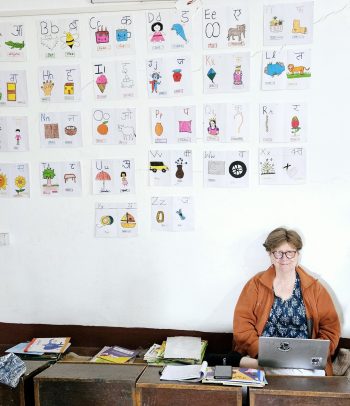
Duffer at her desk in the new library, February 2025. Photo by Donna Lynn Brown.
Another contributor is Duffer, a retired teacher and librarian from the USA. Duffer spent several months in the 23/24 year at the school and has returned for the 24/25 year. For part of 2024, she was joined by her friend and fellow teacher Kim. Kim and she both expect to be back in 25/26 as well. Aided by a young Indian-American man named Vamsi, the friends completely re-established the school’s library in 23/24. Duffer brought and bought books and other resources, and organized the team’s work. They identified needs, sorted useful from outdated or unsuitable items, designed a new room and new shelving, categorized books by subject, catalogued them and entered them into a database, and taught students the purpose of the library, how to find what they wanted, take out books, and keep things orderly. “We wanted to make the library beautiful and the books accessible,” she said, “so the kids would be attracted. It’s working. Some days more want to be there than we can even fit in.”
In autumn 2024, Duffer ran a GoFundMe campaign for more needed items. “We just got in 600 new books in Hindi,” she reported. “That’s a lot of cataloguing, but the books are great. Indian kids’ books may not be as glossy as American ones, but the stories and drawings are terrific. The kids have so much fun with them.” She continues to steward the library and also works with teachers on lesson planning and teaching methods, sometimes co-teaching to help them learn new approaches. As well, she is developing “circle time”: small group discussions to teach the 16 Guidelines, in place of large assemblies, that better support learning by children affected by trauma.
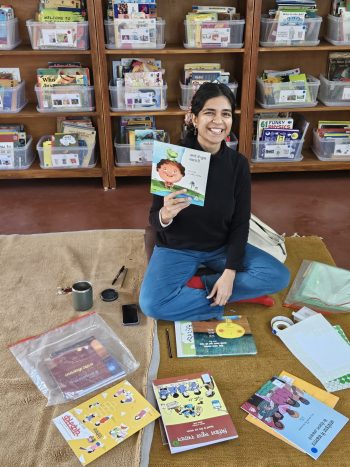
Neelashi cataloguing some of the new Hindi-language books, February 2025. Photo by Donna Lynn Brown.
Neelashi, originally from Rajasthan, has been a staff member of the school since August 2024. She has Masters degrees in both education and Buddhist Studies and is a trained Waldorf teacher. Her main job is working with teachers. She also teaches classes, works directly with students, and attends to students’ physical and psychological health. One concern she has is nutrition. Many students eat little or no breakfast. In 22/23 and 23/24, Root Institute was able to give them, when they arrived each morning, peanuts and bananas—protein, vitamins, and calories. However, grant funding for that program expired in early 2024. Neelashi is trying to raise funds to restore it. She has also applied to Kyentse Foundation for a grant to produce books she is planning to help the children create: books in which they depict their own lives in words and pictures.
Neelashi has found that the students often prefer to learn experientially, not be “just told.” They are eager to figure things out—and giving them the chance improves learning outcomes. So, she indicated, “we have to give them experiences” using images, stories, discussions, games, puppets, and so on in place of lectures. “I work with the teachers on this as a colleague,” she said. “I go in their classrooms, I give examples of how I would teach something.” That way the teachers learn new methods. As well, she mentioned, “we have started adding small things to make the classrooms more energetic, friendly, colorful, heartful. A lot of thought goes into this and it creates a better environment.” She also works with the children to help them learn to relate in healthy ways to adults when their home experiences have been negative. She summed up her role by saying, “The school is in a beautiful place—Bodhgaya—but at the same time, in the most difficult place, one of the poorest states in India, which means education cannot just be English, Hindi, science, math. The regular teachers will do that. But education has to mean other things too. That’s my work. Paying attention to how we are as human beings.”
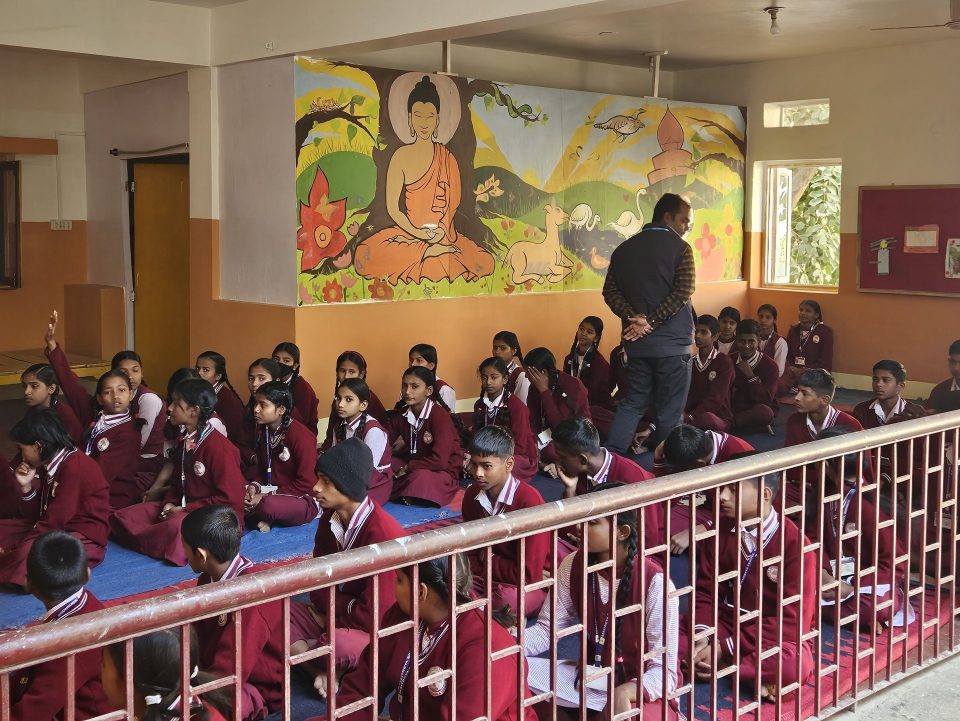
A Universal Education lesson, February 2025. Photo by Donna Lynn Brown.
Will the school continue to evolve? “Absolutely,” said Kabir. “We haven’t fully mastered best practices in teaching, for one. That’s a work in progress. We’d like to teach yoga. Also help the children to better integrate the 16 Guidelines. Rinpoche wanted us to incorporate drama as one way to do that. And we’d like to add some kinds of Buddhist teachings. We are trying as well to learn from other Buddhist-run schools that are improving curricula and methods. We can also better encourage the kids’ creativity to help them contribute to society. There’s plenty to do and I hope to spend the coming decade making it happen.” Added Duffer, “Realistically, the school needs money. We need laptops. Renovations. Better salaries for teachers so, when we train them in new methods, they don’t leave for government schools that pay more. We have great volunteers, but some improvements take money too.”
In early February 2025, Maitreya School had a distinguished visitor: Geshe Lhakdor, formerly His Holiness’s translator and now Director of The Library of Tibetan Works and Archives. Geshe-la gave a talk in Hindi to the teachers and answered their questions, emphasizing the value he placed on the school. When he subsequently gave a Dharma teaching in English at Root Institute, he began by mentioning the plight of Bodh Gaya’s street children. He went on to say, “Root Institute has opened this school, that’s the right thing… there is so much poverty in Bodhgaya. You can walk around the stupa but it is more important to change this place. … Walking around the stupa is still important but we have to help sentient beings. That’s what pleases the Buddha most.” Encouraging words for all who help the school and its children!
You can read more about Maitreya School’s recent utilization of a grant from the FPMT Social Services Fund.
Written by Donna Lynn Brown. Donna is a former Associate Editor of Mandala magazine. She first encountered Lama Zopa Rinpoche and FPMT at a November course at Kopan Monastery in 1996. Recently she completed a Ph.D in which she researched and wrote about FPMT’s social engagement and its intersection with traditional Buddhist teachings.
Foundation for the Preservation of Mahayana Tradition (FPMT), is a Tibetan Buddhist organization dedicated to the transmission of the Mahayana Buddhist tradition and values worldwide through teaching, meditation and community service.
- Tagged: maitreya school
- Home
- News/Media
- Study & Practice
- About FPMT Education Services
- Latest News
- Programs
- New to Buddhism?
- Buddhist Mind Science: Activating Your Potential
- Heart Advice for Death and Dying
- Discovering Buddhism
- Living in the Path
- Exploring Buddhism
- FPMT Basic Program
- FPMT Masters Program
- FPMT In-Depth Meditation Training
- Maitripa College
- Lotsawa Rinchen Zangpo Translator Program
- Universal Education for Compassion & Wisdom
- Online Learning Center
- Prayers & Practice Materials
- Overview of Prayers & Practices
- Full Catalogue of Prayers & Practice Materials
- Explore Popular Topics
- Benefiting Animals
- Chenrezig Resources
- Death & Dying Resources
- Lama Chopa (Guru Puja)
- Lama Zopa Rinpoche: Compendium of Precious Instructions
- Lama Zopa Rinpoche: Life Practice Advice
- Lama Zopa Rinpoche Practice Series
- Lamrim Resources
- Mantras
- Prayer Book Updates
- Purification Practices
- Sutras
- Thought Transformation (Lojong)
- Audio Materials
- Dharma Dates – Tibetan Calendar
- Translation Services
- Publishing Services
- Teachings and Advice
- Find Teachings and Advice
- Lama Zopa Rinpoche Advice Page
- Lama Zopa Rinpoche: Compendium of Precious Instructions
- Lama Zopa Rinpoche Video Teachings
- ༧སྐྱབས་རྗེ་བཟོད་པ་རིན་པོ་ཆེ་མཆོག་ནས་སྩལ་བའི་བཀའ་སློབ་བརྙན་འཕྲིན།
- Podcasts
- Lama Yeshe Wisdom Archive
- Buddhism FAQ
- Dharma for Young People
- Resources on Holy Objects
- Ways to Offer Support
- Centers
- Affiliates Area
- Teachers
- Projects
- Charitable Projects
- Make a Donation
- Applying for Grants
- News about Projects
- Other Projects within FPMT
- Support International Office
- Projects Photo Galleries
- Give Where Most Needed
- FPMT
- Shop
Translate*
*powered by Google TranslateTranslation of pages on fpmt.org is performed by Google Translate, a third party service which FPMT has no control over. The service provides automated computer translations that are only an approximation of the websites' original content. The translations should not be considered exact and only used as a rough guide.If you don’t know your own psychology, you might ignore what’s going on in your mind until it breaks down and you go completely crazy.








